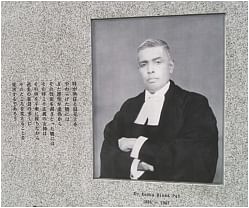| Home - Back Issues - The Team - Contact Us |
 |
| Volume 11 |Issue 39| October 05, 2012 | |
|
|
Remembrance A Man Forgotten by His Own People Keramat Ali Khan Following World War II, an international war tribunal was convened on the 5th of May 1946. Popularly known as the 'Tokyo Trial', the tribunal's purpose was to try the top 25 Japanese leaders for the crimes they had committed during the war. There were 11 jurors from different countries in the probe, which took more than two years to reach to a judgment. On the day of final judgment, the 12th of November 1948, the court house was full of people, but the crowd was astonishingly silent. They were all anxiously waiting for the verdict. The judges started pronouncing their verdict as 'Guilty', one after another. All of a sudden, a voice thundered saying 'Not guilty!' This verdict stunned the audience. The judge saying the unthinkable was Radha Binod Pal, an Indian juror appointed to the tribunal by the British Indian government. He had a different perspective on the war from the other jurors, believing that the tribunal was incapable of providing a fair judgment. Pal argued that Japan had not initiated the atrocities in Asia, but rather it was imposed upon them. He also noted that the atomic bombing by the Americans was a far more violent act, comparing it to the Nazi Holocaust. In the judgment, he further stated that the use of the legal process was deceptive and used to quench the thirst for revenge of the authorities. He added that each and every one of the accused should be found not guilty and should be acquitted of all the charges. Justice Pal is still a highly regarded person in Japan because of his stance.
A monument of this dissenting judge was erected at the National Memorial known as Ysukushi Shrine in Tokyo in 2005. Every year, around 8 million Japanese people visit the monument and pay their homage to the great friend of their nation. Most surprisingly, Pal was a Bengali national. He was born in the village of Salimpur in Kushtia district in undivided Bengal, now Bangladesh. Having lost his father at a very early age, Pal grew up in the home of his maternal uncle but he was not treated with the same care that his cousins received. Like many great people, his childhood was filled with challenges and hardships. Not allowed to attend school himself, Pal used to carry the school bags of his cousins and was kept sitting outside the classroom. Pal's memory was very sharp and he used this talent to memorise the lessons he would overhear while waiting for his cousins' classes to end. At home he used to listen to his cousins as they read aloud and did their homework. Pal's natural ability was eventually noticed by a kind teacher named Imam Ali and he was admitted to the school thanks to Ali's intervention on his behalf. Pal shined in the classroom. His extraordinary merit was exposed in the entrance examination where he came first in undivided Bengal. After finishing his schooling in Kushtia, Pal did his secondary education in Mymensingh Ananda Mohan College and he later moved to Kolkata for further studies. He was also a teacher at Rajshahi Government College for some time. After graduating, he studied law and joined the Indian judiciary. Pal was forever grateful to his first teacher and guru. He used to write to him regularly and paid his respects to him in the later part of his life. He used to visit him whenever he returned home to his birthplace in Kushtia. Some of these valuable letters are still in the possession of one of Ali's nephews. These letters are assets of the nation and should be preserved immediately. Pal is hardly known in our country despite being one of the few Bengalis who has upheld and glorified our nation for decades. India has worked tirelessly to build stronger bilateral ties with Japan especially in the field of tourism. The amount of love and respect that Pal received from Japan can easily be used to endear Bangladesh to the Japanese nationals as the birthplace of Radha Binod Pal. A museum dedicated to his memory would increase tourism and boost the local economy of Kushtia. The writer is a retired major of the Bangladesh Armed Forces and currently G M Marketing Bangladesh Parjatan Corporation.
|
||||
|
